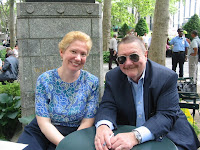Crippen & Landru has published
The Murder in the Stork Club and Other Mysteries, an anthology of
Vera Caspary's short stories. I played a small part in the book, as A. B. Emrys,

who wrote the
Clues 23.3 article "
Laura, Vera, and Wilkie," mentioned that mystery stories, which had only been published in magazines, existed in the Caspary papers at the Wisconsin Center for Film and Theater Research; I suggested that she contact C&L's Doug Greene regarding a possible publication.
Emrys (University of Nebraska–Kearney) has done significant critical work on Caspary; in addition to her
Clues article, she wrote afterwords to the new editions of Caspary's
Laura and
Bedelia published by Feminist Press. Her introduction to the collection connects Caspary's fiction, play, and film work with events in her life.
As Emrys notes (pp. 8, 15), Caspary was not a great mystery fan, although she admired the work of
Wilkie Collins and
Cornell Woolrich, as well as Before the Fact by Francis Iles (aka
Anthony Berkeley Cox; filmed as Suspicion by Alfred Hitchcock). The stories continue Caspary's interest in sexual politics and racial issues, and further illuminate her role as a trailblazing writer and professional woman. The menace in her "Stranger in the House" (1943) recalls
Charlotte Armstrong or
Celia Fremlin. "The Murder in the Stork Club" offers a possible future scenario for the relationship between
Laura's Mark McPherson and Laura Hunt, as it features a detective husband and his wife, a writer of radio programs (echoing the Ann Sothern character in
A Letter to Three Wives, on which Caspary served as screenwriter). It also includes a Christie-like gathering of suspects at the glamorous club.
For my take on Caspary's wry autobiography,
The Secrets of Grown-ups, go
here.
... to my mind crime is sordid and inevitably associated with gangsters, frustrated choir singers in dusty suburban towns, and starving old ladies supposed to have hidden vast fortunes in the bedsprings.
—Vera Caspary, "Sugar and Spice." 1943. The Murder in the Stork Club and Other Mysteries 60
About the photo: Vera Caspary, by Jane Rady. From The Secrets of Grown-ups.
 includes "1891: The Proof That Fingerprints Are Unique," which discusses the still-used classification system for fingerprints developed by Sir Francis Galton, a cousin of Charles Darwin.
includes "1891: The Proof That Fingerprints Are Unique," which discusses the still-used classification system for fingerprints developed by Sir Francis Galton, a cousin of Charles Darwin.


















